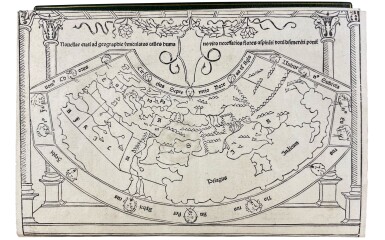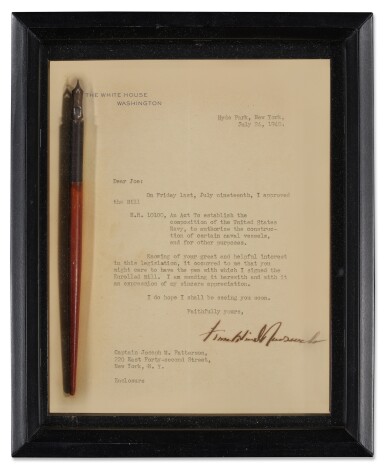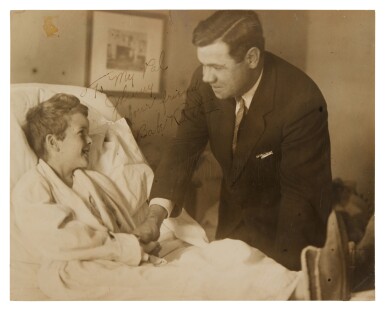Ellery, WilliamAutograph letter signed ("William Ellery") to his thirteen-year-old daughter Lucy, suggesting her future responsibilities in the Ellery household
3 pages (190 x 161 mm) on a bifolium (watermarked royal English arms), Newport, 9 June 1766, integral autograph address panel directed to Lucy at Cambridge; fold separations neatly repaired with some tiny chips and losses touching a few letters, lightly soiled.
A loving—but nonetheless daunting—letter from Ellery to his daughter: "I want to see you put on the Woman. … The nice, prudent conduct of a family is the greatest female accomplishment.''
The Rhode Island Signer here expresses interest in the progress of thirteen-year-old Lucy' education—and his desire for her to help manage his household in the wake of her mother’s death. Lucy was at the time staying with a maternal aunt and uncle in Cambridge. "Though I wrote to you very lately, yet as I have a good Opportunity by Mr. Turner I can't forbeare writing to you more because I know it will please you to hear from Us. We are all pleased to find that you have enjoyed so much Health. Indeed Lucy we want to see you though I could deny myself that Pleasure for your Good. … The Children wonder how you look; whether you are grown handsomer or taller. … As I wrote you, it will be inconvenient for Me to bring you home till after Commencement. … In the meantime improve every Hour to the best Advantage. Don't be concerned lest I should expect too much from you. Parents are indeed apt to overrate the Capacities of their Children & to expect great Things from Them. I believe I am not of that sort. … I am sure that you have as fine an Example of every female Accomplishment. … If you have learned how to conduct yourself & have acquired any tolerable degree of Steadiness my principal Design in your being abroad is answered."
One of Ellery's principal concerns was the upbringing of Lucy's three-year-old brother, which he hoped to soon entrust to Lucy and her older sister, Elizabeth. "You can't conceive what Pleasure it would give Me to see Bessy & you combining together in conducting Family Affairs with Prudence & Discretion—I know you are both young—Determine to do as well as you can & you may depend upon my making all proper Allowances in that Score. I intend to get rid of Meribah as soon as Tronbridge is a little bigger, & if you and Bessy discover that by your Conduct, that I have no need of a Housekeeper. Meribah to do her Justice is very good to Tronbridge, indeed she is too good. She humours him so much that if she should have Management of him long, He who is a clever Boy at present … would be entirely spoiled. I think she is more active than she was, and perhaps taken altogether is as good a Housekeeper as I could get, But I don't like hired Housekeepers." Ellery clearly thought that Lucy's duties in her parental home would also help prepare her for own future role as a wife and mother: "I want to see you put on the Woman, and begin to do that which you may be obliged to attempt some time or other. The nice, prudent Conduct of a Family is the greatest female Accomplishment, & to obtain this attention & Steadiness are the principal necessary Qualifications; & these are to be acquired by Practice.'' Ellery closes by sending his regards to his in-laws and adding a marginal postscript, "Your Sisters & Brothers send Love to you."
Ellery lost his first wife, Ann Remington of Cambridge, Massachusetts, in 1764; his daughters—including Lucy who was living with her mother's family in Cambridge—were too young to take over the running of the household, an accomplishment that Ellery was clearly much looking forward to. Ellery was remarried in 1767 to his second cousin, Abigail Cary. Lucy herself married William Channing in 1773; the couple had five children, and Lucy, who was widowed in 1793, lived until 1834.
PROVENANCE:Swann, 12 May 2005, lot 3 (undesignated consignor) — Sotheby's New York, 21 June 2007, lot 26 (undesignated consignor)
Ellery, WilliamAutograph letter signed ("William Ellery") to his thirteen-year-old daughter Lucy, suggesting her future responsibilities in the Ellery household
3 pages (190 x 161 mm) on a bifolium (watermarked royal English arms), Newport, 9 June 1766, integral autograph address panel directed to Lucy at Cambridge; fold separations neatly repaired with some tiny chips and losses touching a few letters, lightly soiled.
A loving—but nonetheless daunting—letter from Ellery to his daughter: "I want to see you put on the Woman. … The nice, prudent conduct of a family is the greatest female accomplishment.''
The Rhode Island Signer here expresses interest in the progress of thirteen-year-old Lucy' education—and his desire for her to help manage his household in the wake of her mother’s death. Lucy was at the time staying with a maternal aunt and uncle in Cambridge. "Though I wrote to you very lately, yet as I have a good Opportunity by Mr. Turner I can't forbeare writing to you more because I know it will please you to hear from Us. We are all pleased to find that you have enjoyed so much Health. Indeed Lucy we want to see you though I could deny myself that Pleasure for your Good. … The Children wonder how you look; whether you are grown handsomer or taller. … As I wrote you, it will be inconvenient for Me to bring you home till after Commencement. … In the meantime improve every Hour to the best Advantage. Don't be concerned lest I should expect too much from you. Parents are indeed apt to overrate the Capacities of their Children & to expect great Things from Them. I believe I am not of that sort. … I am sure that you have as fine an Example of every female Accomplishment. … If you have learned how to conduct yourself & have acquired any tolerable degree of Steadiness my principal Design in your being abroad is answered."
One of Ellery's principal concerns was the upbringing of Lucy's three-year-old brother, which he hoped to soon entrust to Lucy and her older sister, Elizabeth. "You can't conceive what Pleasure it would give Me to see Bessy & you combining together in conducting Family Affairs with Prudence & Discretion—I know you are both young—Determine to do as well as you can & you may depend upon my making all proper Allowances in that Score. I intend to get rid of Meribah as soon as Tronbridge is a little bigger, & if you and Bessy discover that by your Conduct, that I have no need of a Housekeeper. Meribah to do her Justice is very good to Tronbridge, indeed she is too good. She humours him so much that if she should have Management of him long, He who is a clever Boy at present … would be entirely spoiled. I think she is more active than she was, and perhaps taken altogether is as good a Housekeeper as I could get, But I don't like hired Housekeepers." Ellery clearly thought that Lucy's duties in her parental home would also help prepare her for own future role as a wife and mother: "I want to see you put on the Woman, and begin to do that which you may be obliged to attempt some time or other. The nice, prudent Conduct of a Family is the greatest female Accomplishment, & to obtain this attention & Steadiness are the principal necessary Qualifications; & these are to be acquired by Practice.'' Ellery closes by sending his regards to his in-laws and adding a marginal postscript, "Your Sisters & Brothers send Love to you."
Ellery lost his first wife, Ann Remington of Cambridge, Massachusetts, in 1764; his daughters—including Lucy who was living with her mother's family in Cambridge—were too young to take over the running of the household, an accomplishment that Ellery was clearly much looking forward to. Ellery was remarried in 1767 to his second cousin, Abigail Cary. Lucy herself married William Channing in 1773; the couple had five children, and Lucy, who was widowed in 1793, lived until 1834.
PROVENANCE:Swann, 12 May 2005, lot 3 (undesignated consignor) — Sotheby's New York, 21 June 2007, lot 26 (undesignated consignor)















Testen Sie LotSearch und seine Premium-Features 7 Tage - ohne Kosten!
Lassen Sie sich automatisch über neue Objekte in kommenden Auktionen benachrichtigen.
Suchauftrag anlegen